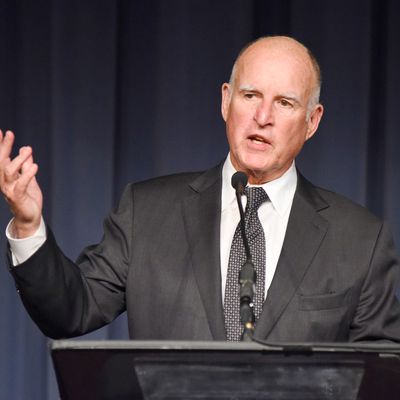
One of the ongoing news stories we are likely to hear about in 2017 is the state of California’s defiance of a climate-science-denying Trump administration. With fossil-fuel enthusiast Scott Pruitt slated to execute a hostile takeover of the Environmental Protection Agency, and given a Trump economic strategy that may depend on a massive expansion of oil, gas, and even coal production, everything blue states — and especially California — have been planning on for years in the way of carbon-emissions reduction and clean-energy promotion is in peril.
That is certainly well-understood in Sacramento. The very day after the election, the leaders of California’s two legislative chambers (where Democrats hold a super-majority) issued what might be described as a call to arms:
California has long set an example for other states to follow. And California will defend its people and our progress. We are not going to allow one election to reverse generations of progress at the height of our historic diversity, scientific advancement, economic output, and sense of global responsibility.
And while the statement alluded to Trump’s proposed immigration and antiterrorism policies, Governor Jerry Brown has subsequently made it clear that climate change is the most immediate battleground:
Gov. Jerry Brown directly challenged the incoming Trump administration on climate change Wednesday, promising that California will fight any attempt to roll back progress on the environment, including possibly launching its “own damn satellite” to track global warming.
“We’ve got a lot of firepower,” Brown told more than 3,000 climate scientists attending the American Geophysical Union conference at Moscone Center in San Francisco. Not only is California the world’s sixth-largest economy, “we’ve got the scientists, we’ve got the universities, we’ve got the national labs and we have the political clout for the battle. And we will persevere, have no doubt about that.”
As any Southerner can tell you, state saber-rattling toward the Feds is easier to articulate than to implement. And there are two immediate problems Trump and the Republican Congress could create for a go-it-alone Golden State when it comes to climate change and other progressive environmental priorities. The first is that all those scientists, universities, and national labs Brown boasted about depend pretty heavily on federal funding, which could be slashed next year. The second is that California has long relied on the principle — almost always followed in Democratic administrations and sometimes even under Republicans — that states which choose to enact tougher environmental standards than Washington can usually receive waivers to do so. With Pruitt at the EPA, that is no longer a safe assumption.
More generally, California is likely to test the GOP’s fidelity to the supposedly high value the party places on federalism and maximum flexibility for states and localities. We will likely discover again that Republicans are all for federalism as long as the jurisdictions taking advantage of flexibility pursue policies conservatives favor. When business lobbies unhappy with state policies run to Washington seeking relief, they usually find a sympathetic audience from GOP lawmakers, philosophy be damned.
The other big question raised by California’s defiant stance on environmental regulations is whether it will succumb to the “race to the bottom” psychology, whereby states that act on the public’s behalf in a way that increases business costs are punished (or fear that they will be punished) by employers and investors going elsewhere. That is already a specter being raised by California business interests and their political allies:
“If the other states pursue no climate change policies, and we continue to go it on our own with our climate change policies, then we would be at a competitive disadvantage for either relocating companies or growing companies here, particularly manufacturing factories,” said Rob Lapsley, the president of the California Business Roundtable.
Still, the technology sector and clean-energy companies represent a much larger share of the business community in California than in most states, making “race to the bottom” pressures less urgent. And overriding the entire issue could be the strong atmosphere of mutual hostility between the Trump administration and the state that gave Hillary Clinton a 4.2 million popular-vote margin in November. The battle between Sacramento and Washington over climate change and other environmental issues may just be heating up.






























